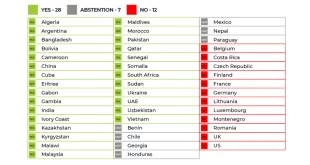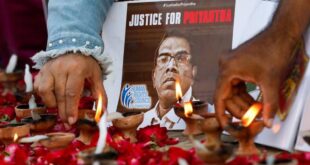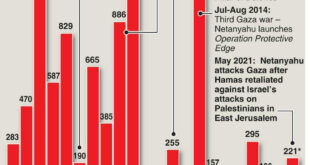.jpg) Signs of cracks within the alliance that ousted Colonel Muammar Gaddafi, the fugitive Libyan strongman, are emerging while the North Atlantic Treaty Organisation (NATO) countries, which have invested billions of dollars in their effort to help the rebels capture Libya and end four decades of dictatorship, are in a quandary.
Signs of cracks within the alliance that ousted Colonel Muammar Gaddafi, the fugitive Libyan strongman, are emerging while the North Atlantic Treaty Organisation (NATO) countries, which have invested billions of dollars in their effort to help the rebels capture Libya and end four decades of dictatorship, are in a quandary.
It appears that after all that NATO investment Libya may see the emergence of an anti-West Islamic state. Western nations which gathered in Paris yesterday for an international conference to discuss Libya, incidentally on the 42nd anniversary of the coup that brought Gaddafi to power, are now trying to work out a formula to accommodate the Islamists' aspirations so that they could gobble up the war-ravaged nation's oil wealth. But this may not work, given the Islamists' anti-West stance.
NATO or the West was not unaware that a large segment of the anti-Gaddafi alliance consisted of Islamists or jihadists. NATO leaders knew they were taking a risk by arming and training the Islamists, but they felt that the profit to be made in post-Gaddafi Libya was worth it.
The Western nations want to see the emergence of a secular, democratic, liberal, pro-western and pro-business regime in post-Gaddafi Libya so that they could rake in the profits of the multi-billion dollar investment or intervention. The Islamists, on the other hand, saw the alliance with NATO as a necessary evil in their jihad to set up an Islamic state though they opposed the US occupation of Iraq and Afghanistan.
Given these conflicting agendas, the allies — NATO and the Libyan Islamists — are more likely to become enemies than friends in post-Gaddafi Libya. The emerging picture was vividly explained by US Congressman and Republican Party presidential prospect Ron Paul last week. "We face a situation where a rebel element we have been assisting may very well be radical jihadists, bent on our destruction, and placed in positions of power in a new government," he warned adding "worse still, Gaddafi's successor is likely to be just as bad, or worse, than Gaddafi himself."
Although pro-NATO elements also exist within the rebel ranks and the Transitional National Council leaders Mustafa Abdel Jalil and his cronies bend backwards to please their NATO masters, the bulk of the fighting was done by the Islamists and those who joined the battle to settle old scores stemming from tribal rivalry.
The Islamists now appear to be taking the upper hand, as lawlessness and mayhem continue in Libya two weeks after Gaddafi and his family together with their loyal troops went into hiding in the face of the NATO-backed rebel attack on Tripoli.
.jpg)
The power and influence of the Islamists are already evident. They have succeeded in including Shariah law into Libya's post-Gaddafi constitution while Tripoli has been put under the military command of Abdelhakim Belhaj, founder of the Libyan Islamic Fighting Group, a banned terrorist organization on the US State Department list. Belhaj fought against the US-led NATO troops in Afghanistan and was captured. He was taken to the US and was to be sent to the notorious Gulag prisons in Guantanamo Bay in 2004, but instead he was handed over to the Gaddafi regime which by this time had become a good buddy of the George Bush administration. After six years in a Libyan prison, Gaddafi released him under a general amnesty.
With Belhaj and his LIFG now firmly in the saddle, their al-Qaeda links and Islamic fervour, which NATO sought to ignore during the campaign to oust Gaddafi, have now become a major problem to the West. Adding to the problem is Gaddafi's huge arsenal. Missing from Libya's arms dumps following the capture of Tripoli are not only light weapons such as automatic rifles, but also shoulder-fired missiles and deadly mustard gas.
It is naïve to assume that NATO was unprepared to deal with the threat posed by the Islamists. It had implemented countermeasures to check the threat from the Islamists in the rebel ranks.
During the war quite a number of anti-Gaddafi rebels were killed in one-too-many NATO air attacks, giving rise to suspicions that the Jihadi leadership was being eliminated with inside help. It is no secret that Khalifa Hifter, the defence minister of the Benghazi-based rebel administration, is a CIA-backed operative. Hifter, a former Libyan army officer, was captured in Chad some 20 years ago and transported to Virginia where he led a life of luxury until he was brought to Benghazi and installed as the rebels' defence minister a few months ago. Obviously, Hifter's primary task was to serve his masters in Washington and he was being blamed for the recent killing of a top rebel military commander Abdel Fatah Younis.
Then there is among the rebels a group backed by the United States, Israel and Saudi Arabia. Israeli investigative journalist Joel Bainerman wrote in his book 'Inside the Covert Operations of the CIA & Israel's Mossad (New York: S.P.I. Books, 1994) that, Israel and the US trained anti-Gaddafi rebels in a number of West and Central African countries. The book claims that funding for the Chad-based the National Front for the Salvation of Libya came from Saudi Arabia, Egypt, Morocco, Israel and Saddam Hussein's Iraq. The NFSL is a main member of the National Conference for the Libyan Opposition, which was largely responsible for the Benghazi uprising that eventually led to the ouster of Gaddafi.
Against this backdrop where the rebel ranks are divided on the basis of their Islamic, tribal or pro-western affiliations, Libya is plunging deeper into chaos. Add to this mess, the threat posed by pro-Gaddafi tribes and loyal forces who are now offering pockets of resistance and lying low or have gone into hiding with their weapons. A nightmare scenario is not far away.
 Sri lanka Muslims Web Portal Diversity and Inclusiveness
Sri lanka Muslims Web Portal Diversity and Inclusiveness



